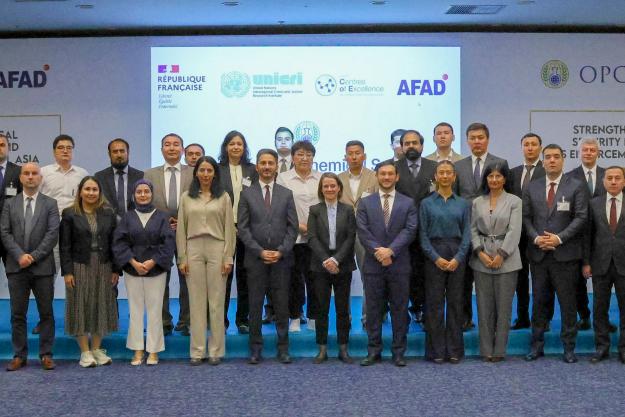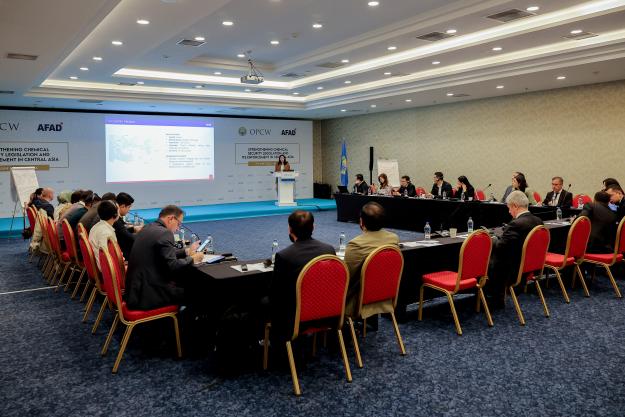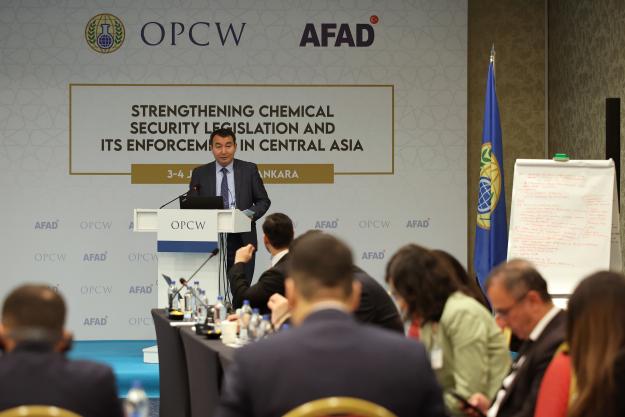
Senior officials from Central Asian States Parties to the Chemical Weapons Convention (CWC) participate in a conference on strengthening chemical security legislation and enforcement capabilities across Central Asia States Parties held in Ankara, Türkiye’s from 3 to 4 June 2025. The workshop was organised by the Organisation for the Prohibition of Chemical Weapons (OPCW) in partnership with the United Nations Interregional Crime and Justice Research Unit (UNICRI) and Türkiye’s Disaster Response Agency (AFAD).
THE HAGUE, Netherlands–25 June 2025–A landmark two-day workshop focusing on strengthening chemical security legislation and enforcement capabilities across Central Asia has concluded in Ankara, Türkiye.
The workshop, held on 3–4 June 2025, was organised by the Organisation for the Prohibition of Chemical Weapons (OPCW) in partnership with the United Nations Interregional Crime and Justice Research Institute (UNICRI) and hosted by Türkiye’s Disaster Response Agency (AFAD). It brought together 32 senior officials from Central Asian States Parties to the Chemical Weapons Convention (CWC) responsible for law enforcement, prosecution, and regulatory frameworks. As the first event of its kind and tailored specifically to the Central Asian sub-region, it featured broad participation from Kazakhstan, Kyrgyzstan, Tajikistan, and Uzbekistan, alongside representatives from Pakistan and Türkiye—all working to address critical gaps in chemical security implementation. The workshop was organised with financial support from France.
The Central Asian sub-region has demonstrated a strong commitment to tackling transnational challenges—ranging from illicit trafficking to the growth of chemical industry and risk of diversion of hazardous materials— shaped by regional geopolitics, complex border management, and instability in neighbouring areas. While national regulatory frameworks continue to develop and improve, further work is needed in enforcement and prosecution, particularly concerning the cross-border movement of hazardous chemicals and their potential misuse by non-state actors.

By helping participants align national laws with international obligations — particularly the CWC and United Nations Security Council Resolution 1540 — the workshop built on earlier efforts of the OPCW and introduced a stronger emphasis on prosecution mechanisms through practical enforcement approaches, illustrated through training materials developed by UNICRI under the European Union’s CBRN Centres of Excellence. The training covered essential skills such as collecting evidence, maintaining the chain of custody for chemical agents, and understanding the legal standards required to prosecute violations under national CWC-implementing legislation. Delivered in both English and Russian, the program highlighted the complexities of handling chemical evidence during investigations and prosecutions, equipping authorities to meet international legal and technical requirements.
A notable feature of the workshop was the presentation by a Georgian state prosecutor of a real-life case study involving a chemical weapon, providing participants with a concrete example of how chemical security legislation can be effectively implemented and enforced. This practical approach was reinforced through tabletop exercises and demonstrations designed to strengthen National Authorities’ capabilities to investigate, prosecute, and respond to chemical security offences.
The workshop also addressed broader enforcement challenges, including cross-border trafficking and emerging threats posed by non-state actors, with participants exploring ways to enhance both national and regional enforcement mechanisms. The expert presentations emphasised the importance of fostering interagency collaboration among law enforcement, legal, and regulatory bodies, recognising that effective communication and coordination between these agencies are critical to tackling chemical security challenges.

The capacity‐building initiative directly supports the OPCW’s mandate to strengthen CWC implementation and prevent the re‐emergence of chemical weapons. Its focus on regional vulnerabilities—porous borders and chemical trafficking—aligns with the Convention’s core objective of a world free of chemical weapons. Through collaboration between the OPCW and UNICRI, subject‐matter expertise is combined in a practical, regionally tailored approach that fosters enhanced cooperation and knowledge sharing among Central Asian states, laying the groundwork for sustainable networks to exchange information and mount unified responses to chemical security threats. As a result, awareness and commitment to CWC implementation have increased across the sub‐region, technical expertise among law enforcement personnel has grown, and regional cooperation mechanisms have been strengthened. Ultimately, this initiative represents a significant step toward building robust national and sub‐regional defences against chemical weapons proliferation and sets a clear precedent for similar efforts in other regions facing comparable challenges.
Background
As the implementing body for the Chemical Weapons Convention, the OPCW, with its 193 Member States, oversees the global endeavour to permanently eliminate chemical weapons. Since the Convention’s entry into force in 1997, it is the most successful disarmament treaty eliminating an entire class of weapons of mass destruction.
In 2023, the OPCW verified that all chemical weapons stockpiles declared by the 193 States Parties to the Chemical Weapons Convention since 1997 — totalling 72,304 metric tonnes of chemical agents — have been irreversibly destroyed under the OPCW’s strict verification regime.
For its extensive efforts in eliminating chemical weapons, the OPCW received the 2013 Nobel Peace Prize.
